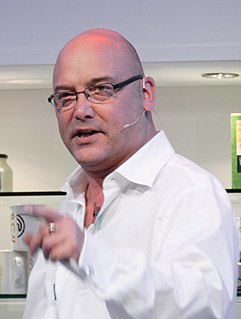A Quote by Michael Pollan
While the surfeit of cheap calories that the U.S. food system has produced since the late 1970s may have taken food prices off the political agenda, this has come at a steep cost to public health.
Related Quotes
We need to realize that these industrial methods of farming have gotten us used to cheap food. The corollary of cheap food is low wages. What we need to do in an era when the price of food is going up is pay better wages. A living wage is an absolutely integral part of a modern food system, because you can't expect people to eat properly and eat in a sustainable way if you pay them nothing. In fact, it's cheap food that subsidized the exploitation of American workers for a very long time, and that's always been an aim of cheap food.
The ninety-nine cent price of a fast-food hamburger simply doesn't take account of that meal's true cost--to soil, oil, public health, the public purse, etc., costs which are never charged directly to the consumer but, indirectly and invisibly, to the taxpayer (in the form of subsidies), the health care system (in the form of food-borne illnesses and obesity), and the environment (in the form of pollution), not to mention the welfare of the workers in the feedlot and the slaughterhouse and the welfare of the animals themselves.
Imagine if we had a food system that actually produced wholesome food. Imagine if it produced that food in a way that restored the land. Imagine if we could eat every meal knowing these few simple things: What it is we're eating. Where it came from. How it found its way to our table. And what it really cost. If that was the reality, then every meal would have the potential to be a perfect meal.
The other way that you democratize the food movement is through the public school system. If you can pay enough for the school lunch system so that it can actually be cooked and not just microwaved, so that these schools can buy local food, fresh food, because right now it's all frozen and processed, you will improve the health of the students, you will improve the health of the local economy, and you will have better performing students.
Fast food may appear to be cheap food and, in the literal sense it often is, but that is because huge social and environmental costs are being excluded from the calculations. Any analysis of the real cost would have to look at such things as the rise in food-borne illnesses, the advent of new pathogens, antibiotic resistance from the overuse of drugs in animal feed, extensive water pollution from intensive agricultural systems and many other factors. These costs are not reflected in the price of fast food.
If there was ever a food that had politics behind it, it is soul food. Soul food became a symbol of the black power movement in the late 1960s. Chef Marcus Samuelsson, with his soul food restaurant Red Rooster in Harlem, is very clear about what soul food represents. It is a food of memory, a food of labor.































